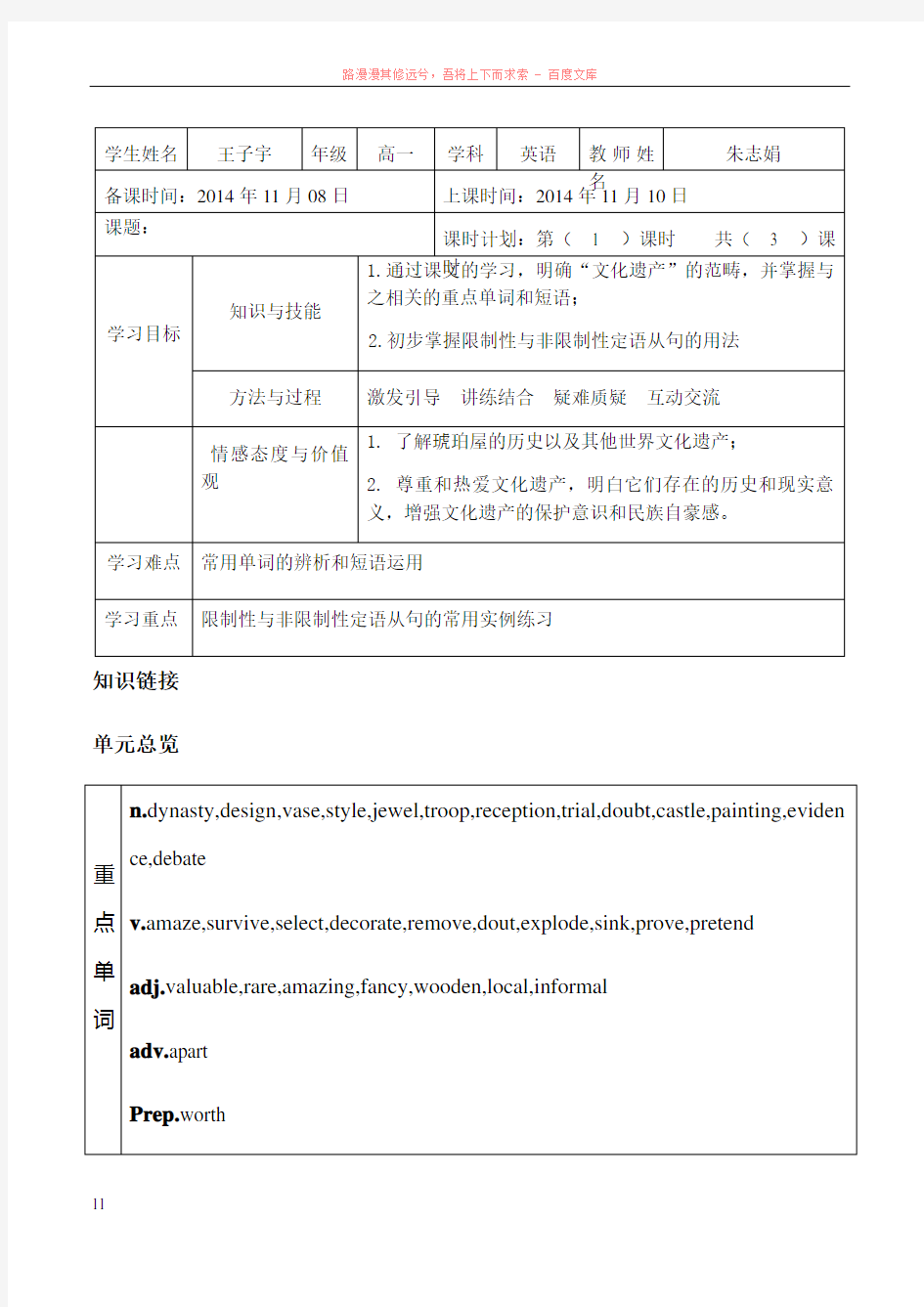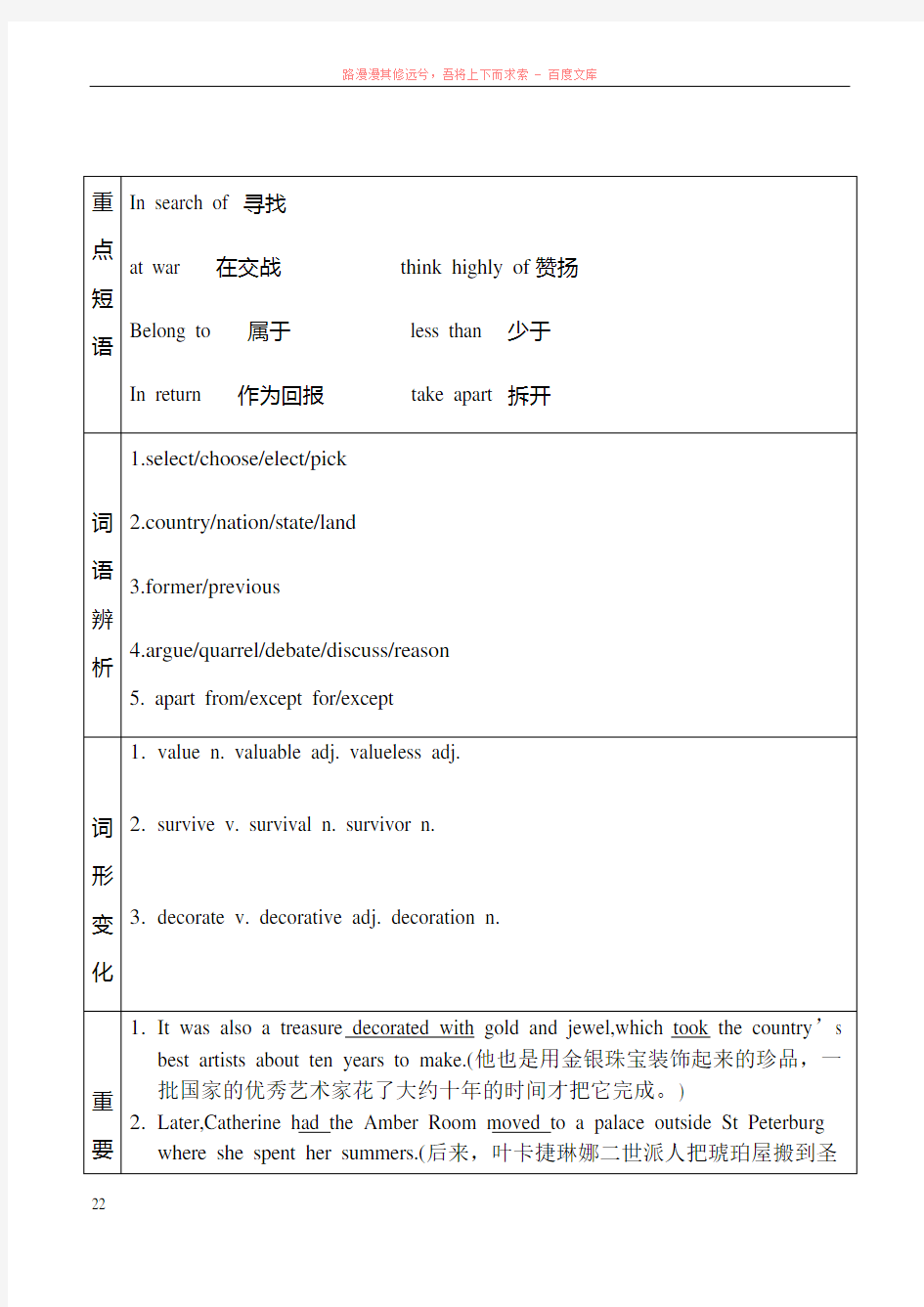

知识链接单元总览
重点单词n.dynasty,design,vase,style,jewel,troop,reception,trial,doubt,castle,painting,eviden ce,debate
v.amaze,survive,select,decorate,remove,dout,explode,sink,prove,pretend
adj.valuable,rare,amazing,fancy,wooden,local,informal
adv.apart
Prep.worth
学生姓名王子宇年级高一学科英语教师姓
名朱志娟
备课时间:2014年11月08日上课时间:2014年11月10日
课题:
课时计划:第( 1 )课时共( 3 )课
时
学习目标
知识与技能
1.通过课文的学习,明确“文化遗产”的范畴,并掌握与
之相关的重点单词和短语;
2.初步掌握限制性与非限制性定语从句的用法
方法与过程激发引导讲练结合疑难质疑互动交流
情感态度与价值
观
1. 了解琥珀屋的历史以及其他世界文化遗产;
2. 尊重和热爱文化遗产,明白它们存在的历史和现实意
义,增强文化遗产的保护意识和民族自豪感。
学习难点常用单词的辨析和短语运用
学习重点限制性与非限制性定语从句的常用实例练习
重点短语In search of 寻找
at war 在交战think highly of赞扬Belong to 属于less than 少于
In return 作为回报take apart 拆开
词语辨析1.select/choose/elect/pick
2.country/nation/state/land
3.former/previous
4.argue/quarrel/debate/discuss/reason
5. apart from/except for/except
词形变化1.value n. valuable adj. valueless adj.
2.survive v. survival n. survivor n.
3.decorate v. decorative adj. decoration n.
重要1.It was also a treasure decorated with gold and jewel,which took the country’s
best artists about ten years to make.(他也是用金银珠宝装饰起来的珍品,一批国家的优秀艺术家花了大约十年的时间才把它完成。)
https://www.doczj.com/doc/033806616.html,ter,Catherine had the Amber Room moved to a palace outside St Peterburg
where she spent her summers.(后来,叶卡捷琳娜二世派人把琥珀屋搬到圣
句型
彼得堡郊外她避暑的宫殿里。)
3.There is no doubt that the boxes were then put on a train for konigsberg…(毫
无疑问,这些箱子后来被装上火车运往哥斯尼堡)
4.Is it worth rebuliding lost cultural relics such as the Amber Room or Yuan
Ming Yuan in Beijing?(重建琥珀屋.北京圆明园等这些已逝的文化遗产值得吗?)
核
心
语
法
限制性定语从句与非限制性定语从句
功能意念1.征求意见(Asking for opinions)
Are you sure…? How can you be sure…?
How do you know that? Why/Why not ?
2.发表看法(Giving opinions)
That can’t be ture.
I don’t believe/think…,because..
I disagree what you said,because…
I agree with you.
….has no reason to lie. …没理由撒谎。
主
题
写
作
如何写辩论式议论文
(一)词语辨析:
1.select/choose/elect/pick
select:指在大范围内“精选或淘汰”,侧重以客观为标准来选择。
elect:按照一定的法律和规章,用投票的方式认真慎重的选择。
choose:普通用词,侧重根据自己的意愿和判断来选择,着重被选者的优点。
pick:口语用词,强调从个人的角度在众多当中任意选定。
自主探究:
●Please a good book for me.
●She a diamond ring from the collection.
●We our monitor by a show of hands.
●She the red sweater rather than the pink one.
(choose, chose,chosen)
2.country/nation/state/land
country:指主权的统一的国家,侧重于疆土,是中性词,有时指全国的人民,还可指与城市相对的农村。
nation:国家,比State更庄重,有时侧重于“人民,国民”,也指“民族”。
state:政权意义上的国家、政府,也指“州”。
land:国土意义上的国家,是文学用语,多见于诗歌中。
自主探究:
●After many years abroad,she wanted to return to her .
●The Jewish is scattered around the world.
●The US is divided into 50 .
●We returned to the where she was born.
3.former/previous
former:latter的反义词,对比意味强。
previous:指时间上、顺序上较早,或指正在谈论的某事的前一个。
自主探究:
●1)The protests had been planned since the evening.
●2) He'll go to school in part of the year.
●3) Of the two is better than .
4.argue/quarrel/debate/discuss/reason辩论、争论、说理
argue: 指提出理由或证据为自己或我方的看法和立场辩护,注重说理、论证和企图说服。quarrel:指两人之间或两个团体之间不友好地、吵吵嚷嚷地大声争论某事,尤指“吵架,拌嘴”。debate:侧重指意见对立的双方之间正式或公开地争辩。discuss:指就某一或某些问题表明观点、看法,以便统一认识,解决问题。reason:指据理力争以说服对方或求得对问题更深入地研究。
自主探究:
●1)Do not , but .
●2)People generally because they cannot .
●3)I have no to with him.
●4)Experts the for the these so - called jobless recoveries.
5.apart from/except for/except
apart from:除了…之外(还有)…,其后的宾语和下文的事物均被包括。如:Apart from “angry”and “hungry”,what other common English word ends in “-gry”?
except for: 后接宾语是与前面无相同属性的其他事物。
except:后接宾语要对应前面相同属性的事物。
自主探究:
●1)After Jane had been living Fair for six months, she decided to return to him.
●2) her illnesses, she had had a particularly happy childhood.
●3) I sold everything I owned my car and my books.
●4)He hadn't eaten a thing for one forkful of salad.
(二)重点单词运用
1.fancy adj.不寻常的,精致的;v.想,以为;想象。
e.g.1)That’s a very fancy pair of shoes!那是一双非常精致的鞋。
2)I fancy (that)it’s going to rain today. 我看今天要下雨。
[重点用法]
fancy that…自以为是fancy oneself 自负,自命不凡
fancy (sb’s) doing.. 想象某人做某事fancy sb. to be/as.. 想象/认为某人会成为…[练习]
1)她竟如此放肆。Fancy her being so rude!
2)他以为她喜欢他。He fancies she likes him.
2.consider vt. 考虑,认为
e.g.a.We are considering going to canada. 我们正考虑去加拿大。
b.They consider this (to be) very important.他们认为这个很重要。
[重点用法]
consider doing sth./sth.考虑(做)某事
consider sth./sb. as/to be…
consider it+ adj.+ to do sth. 认为做某事…
considering…考虑到…
1)你是否考虑过如何能到那儿?Have you considered how to get there?
2)他会被认为是个软弱无能的领导。He will be considered (as)a weak leader.
3.wonder n.惊奇,奇迹,想知道…
e.g.1)They were filled with wonder at the sight.他们见此情景惊叹不已。
2)I wonder whether they will arrive on time.我想知道他们是否能准时到。
[重点用法]
wonder +从句自问..,想知道…
wonder + if从句请问是否…
wonder at 对…感到惊奇
4.doubt n.怀疑,不确定,不信任;v.怀疑,对…无把握,不信任
e.g. 1)He is without doubt the cleverest student I’ve ever taught.他无疑是我教过的最聪明的学生。
2)I doubt if that was what he wanted.我不确定那是否是他所要的。
[重点用法]
There is no doubt that/about sth.毫无疑问…
Without doubt…
I doubt if/whether…5.debate.vt. n. 争辩,辩论,仔细思考,思考
e.g. 1)We debated on the question till late into the night.我们就这个问题辩论到深夜。
2)The issue that is important is still under debate.这个重要的问题仍在讨论当中。
[重点用法]
debate sth. with sb.和某人争论某事
debate on/about/over sth.关于…进行讨论
a warm/heated debate一场激烈的辩论
6.worth adj.值得的、有价值的;n.价值,用处。
e.g. 1)The new car cost a lot of money,but it’s certainly worth it.新车虽然花了不少钱,但它的确物超所值。
2)The thieves stolen 1 million worth of jewellery.窃贼偷走了价值100万英镑的珠宝。
3)It’s worth reading the book. 那本书值得一读。
[重点用法]
be worth + n. 当名词为金钱时是“值得(多少钱)”be worthy of + n.名词为抽象名词,表“值得…”be worth of sth. 价值某金额的量,用在表数量和时间等的名词之后。
be worth doing sth./ be worthy to be done某是值得被做be worthwhile to do sth./It is worthwhile doing sth值得做某事It is worth one’s while to do sth.做某事对…有好处;做某事值得。
(三)词组拓展
1.In turn 轮流地,依次,反过来;by turns 时而…时而…
2.would rather do sth….than do sth.(=prefer doing …to doing…)宁愿做..不愿做…
Other than = except for 除了,而非…
3.What do you think of sb./sth.?
think much/well of …对..评价良好think of sb./sth. as…把…当作…
think nothing of …对...无所谓,不把…当回事。think highly of sb./sth. 对…高度评价
4. by design/on purpose 故意地
by accident/by chance意外地
5. search sth. for sth.在…搜查/查找
search sb. for sth.在某人身上搜某物
search for sb. 寻找某人
In the/one’s search for sb./sth.寻找…
(四)语法精讲
限制性与非限制性定语从句
1.限制性定语从句:对先行词有限制作用,使其含义更具体,更明确,并且不可省略的定语从句,一旦省去将导致主句的意义不完整,该从句与主句之间也不能用逗号隔开;常修饰名词或代词,关系代词在从句中作宾语时可以省略。
例:A dictionary is a book which gives the meaning of words.字典是解释词语意思的书。
He is the man (whom) I want to see.他就是我想见的那个人。
2.非限制性定语从句:对先行词没有限制作用,与先行词的关系不是很密切,只是作一些附
加说明,此类从句往往用逗号与主句隔开。
例:The road conditions there turned out to be very good,which was more than we could expect.那条道路状况良好,这一点出乎我们的意料。
She heard a terrible noise,which brought her heart into her mouth.她听到一个可怕的声音,吓得她心都提到了嗓子眼儿。
{注:关系代词有who,whom, that, which, whose;
关系副词有where(地点),when(时间),why(原因).
总体来说关系副词在定语从句中做状语;二者的区别:where,when,why=相应的介词+ which
eg: This is the house in which (where) I lived last year.
This is the reason for which (why) he was late for school.
That's the day on which (when) I met him in the street.
测评提高(举一反三)
1.用所给词的适当形式填空
apart survive look into prove consider pretend
1)Although there were some arguments about the design of the museum at first, with years passing by,it to be a wonderful one.
2)The two tables are too close to each other.Would you please get them .
3)Sadly,few people could the tsunami(海啸)because of its sudden coming.
4)Tired of selling books in the shop all day,John changing a new job these days.
5)After the case, the police decided that Smith had nothing to do with it.
6)Little Johnson isn’t honest enough.He usually to be studying when his mother comes into his room.
2.单项选择
1)The man pulled out a gold watch, were made of small diamonds.
A.the hands of whom
B.whom the hands of
C.which the hands of
D.the hands of which
2) I’ll give you my friend’s home address, I can be reached most evenings. (…几乎每天晚
上你都能在那找到我。)
A.which
B.when
C.whom
D.where
3)The thought of going back home was kept him happy while he was working abroadA.that B.all that C.all what D.which
4)Look out! Don’t get too close to the house roof is under repair.
A.whose
B.which
C.of which
D.what
5)I saw a woman running toward me in the dark.Before I could recognize who she was,she had run back in the direction she had come.
A.of which
B.by which
C.in which
D.from which
6)She was educated at Beijing University, she went on to have her advanced study abroad.
A.after that
B.from that
C.from which
D.after which
7) is often the case,we have worked out the production plan.
A.Which
B.When
C.What
D.As
8)What surprised me was not what he said but he said it.
A.the way
B.in the way that
C.in the way
D.the way which
9)The place the bridge is supposed to be built should be the cross-river traffic is the heaviest.
A.which;where
B.at which;which
C.at which;where
D.which;in which
10)In an hour,we can travel to places would have taken our ancestors days to reach.
A.where
B.when
C.which
D.what
学法指导
1.词汇和短语:反复识记,加强理解,多加练习,灵活运用
2.核心语法:理清思路,明确用法,举一反三,随机应变
教学反思与总结
1.“普遍撒网,重点拿鱼”;着重学习常用及特殊词汇和短语;
2.强调核心语法的定义,判别和用法。
3.有针对性的进行重点练习。
[D] [D] [B][A] [D] [D][D] [A][C][C]